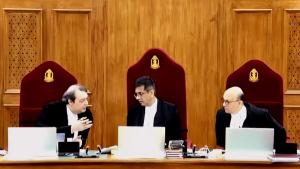How do emergency provisions impact Centre-State relations?

- 17 Sep 2024
In News:
The recent spate of renewed violence in Manipur has once again triggered the discussion around Centre-State relations and the use of emergency provisions by the Centre.
What is our federal set-up?
India is a federation with governments at the Centre and the States. The Seventh Schedule to the Indian Constitution distributes the power between the Union and States. Under this scheme, it is the domain of the State governments to maintain law and order in their respective States.
What are emergency provisions?
The emergency provisions are provided in Part XVIII of the Constitution. Articles 355 and 356 deal primarily with the affairs of government in a State under this part.
Article 355 imposes a duty on the Centre to protect every State from external aggression and internal disturbance. It also specifies that the Centre should ensure that every State government operate according to the Constitution.
Article 356 allows for the imposition of the President’s rule if a State’s government cannot function in accordance with constitutional provisions. While in the U.S. and Australia, federal government functions also involve protecting States, their constitutions do not contain provisions for removing State governments.
B.R. Ambedkar explained the purpose of Article 355, keeping in mind the federal character of our polity, that if the Centre is to interfere in the State’s administration under Article 356, it must be by or under some obligation which the Constitution imposes on the Centre. Hence, Article 355 was incorporated to check any arbitrary or unauthorised use of Article 356.
What have the courts ruled?
Dr. Ambedkar again in the constituent Assembly wished that Articles 355 and 356 would never be called into operation and would remain a dead letter. However, it was a travesty of the Constitutional principles and federalism that Article 356 was misused on several occasions removing elected governments that enjoyed majority in the States. Reasons varied from loss in Lok Sabha elections to deterioration of law and order in the States. It was only after the Supreme Court’s categorical judgement in the S R Bommai case (1994) that such misuse was restricted. The court held that Article 356 should be imposed only in the event of a breakdown of constitutional machinery, as distinguished from an ordinary breakdown of law and order. It also held that the imposition of the President’s rule is subject to judicial review and should not be misused for political reasons.
On the other hand, the scope of Article 355 has been widened by various Supreme Court rulings. In State of Rajasthan Vs Union of India (1977), the court had a narrow interpretation of Article 355 as justifying the employment of Article 356. However, in subsequent cases such as Naga People’s Movement of Human Rights Vs Union of India (1998), Sarbananda Sonowal Vs Union of India (2005), and H.S.Jain Vs Union of India (1997), the legal position with respect to Article 355 has shifted. The scope of actions under this article has been widened to permit all statutorily and constitutionally available actions by the Union to discharge its duties of protecting the State and ensuring that its governance is in accordance with the Constitution.
What are the suggestions?
The Sarkaria Commission on Centre-State Relations (1987), the National Commission to Review the Working of the Constitution (2002), and the Punchhi Commission on Centre-State Relations (2010) have all opined that Article 355 not only imposes a duty on the Union but also grants it the power to take necessary actions for the effective performance of that duty. Imposition of the President’s rule under Article 356 must be used as a last resort in situations of utmost gravity and urgency.
The situation in Manipur is grave. Large-scale violence against innocent civilians, women and children; looting of ammunition from police armoury; drone and missile attacks targeting civilians cannot be viewed as just an ordinary breakdown of law and order. Constitutional as well as political expediency, considering that the same party is in power at the Centre and the State, has resulted in Article 356 not being invoked. However, under Article 355, all possible instructions and actions should continue to be pursued to restore normalcy at the earliest.
